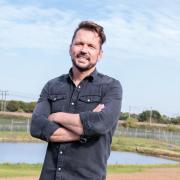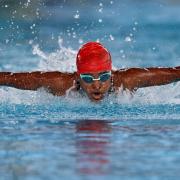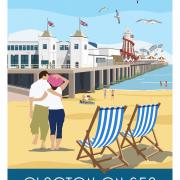While you’re sitting down to your Christmas dinner this year, spare a thought for Nina and Simon Crouchman, who will be in a rowing boat in the middle of the Atlantic Ocean. Taking on the Tallisker Whisky Atlantic Rowing Challenge, the duo will battle with sleep deprivation, salt sores and physical extremes during the 3,000-mile race. We talk to Nina about training for the ultimate test of mind and body...
Married couple Nina and Simon Crouchman have lived in the pretty village of Rowhedge near Colchester for 22 years. It was here, on the banks of the River Colne, that they got into rowing. ‘I’ve been chairman of the rowing club in Rowhedge for ten years,’ Nina tells me. ‘The only problem is that the river is tidal here so we can’t go rowing whenever we like; we tend to go to Brightlingsea where we can launch easier.’
Rowing off the Essex coast is tame compared to what awaits them, though. Nina says, ‘The challenge starts in La Gomera in the Canary Islands and finishes in Nelson’s Dockyard in Antigua.’ Two incredible destinations, but the couple will be battling with Mother Nature for 3,000 miles in between.
Logistically and financially, it has taken Nina and Simon two years to be in a position to compete. ‘We would like to do it in less than 53 days,’ Nina says. ‘That’s the current record for the fastest husband-and-wife team. But that’s all dependent on the weather. The race starts in December, so people think it will be really cold, but we leave in about 15 to 19 degrees and arrive in about 30 degrees. It’s the end of the hurricane season so you get the best of the tidal streams; the swells should push us in the right direction.’
The challenge will see around 30 boats taking part, and there are crews of five people down to solo rowers. ‘It’s all timed and tracked, but we leave four minutes apart at the start and you will not see another one of those boats after about four hours because the ocean is so vast and you’ll all take different routes.’

Over the next 53-or-so days, the pair will be completely self-reliant. ‘There’s no other help,’ Nina explains. ‘You take everything with you; you carry all your food and pump water out of the sea, which is filtered through a Watermaker (a device to make sea water drinkable).’
Not only that, but the boat will be moving 24 hours a day. ‘We’ll be rowing two hours on, two hours off. So, at all times, one of us will be rowing and one of us will be resting. But in those two hours of rest time, you’ve still got to cook your food, do your maintenance, update your social media etc. You’ve also got to get undressed and wipe all the salt off your skin, otherwise it can become really sore. So, if you’re lucky, you’ll get an hour and a half sleep at a time.’
Sleep-deprivation will be one of the toughest things to contend with – that and possible sea-sickness. ‘We’ve been told just to go straight into the sleep-deprivation during the challenge,’ Nina says. ‘Your body will adapt within seven to eight days. For now, we’re saving our energy for training.’
The pair have been on a two-year training schedule with a personal trainer, preparing themselves both mentally and physically. ‘Training starts at 5.30am, and it’s not just a sedate bike ride; we’re having to push heavy weights early because you don’t know what’s going to hit you at any time of day.

‘If I get in from work and I just want to have a cup of tea, then I have to tell myself no, and I’ll get on the rowing machine for half an hour first. You can’t question what you’ve got to do, just go ahead and do it.’
The pair has a cause that’s close to their hearts, which they’re using as motivation. ‘We’re doing it for the Samaritans,’ Nina tells me. ‘Particularly during lockdown, a lot of people were in isolation and felt that loneliness – and that’s a couple of things that we’ll be going through during the challenge. We also lost a friend over lockdown and the Samaritans were there. They do a brilliant job.
‘The hardest part is nearly over, and that’s getting to the start line because of all the logistics involved. Once we get to the start line, we’re looking forward to getting in that boat and just rowing. By that point, we’ve got ourselves mentally fit, medically fit, inspected the equipment, completed a lot of paperwork and had to raise all our sponsorship money – that's the tough bit.’
For sponsorship opportunities, visit mrandmrseas.co.uk. There will be a satellite tracker on the website for the duration of the trip, and you can follow them on social media @MrandMrseas




























